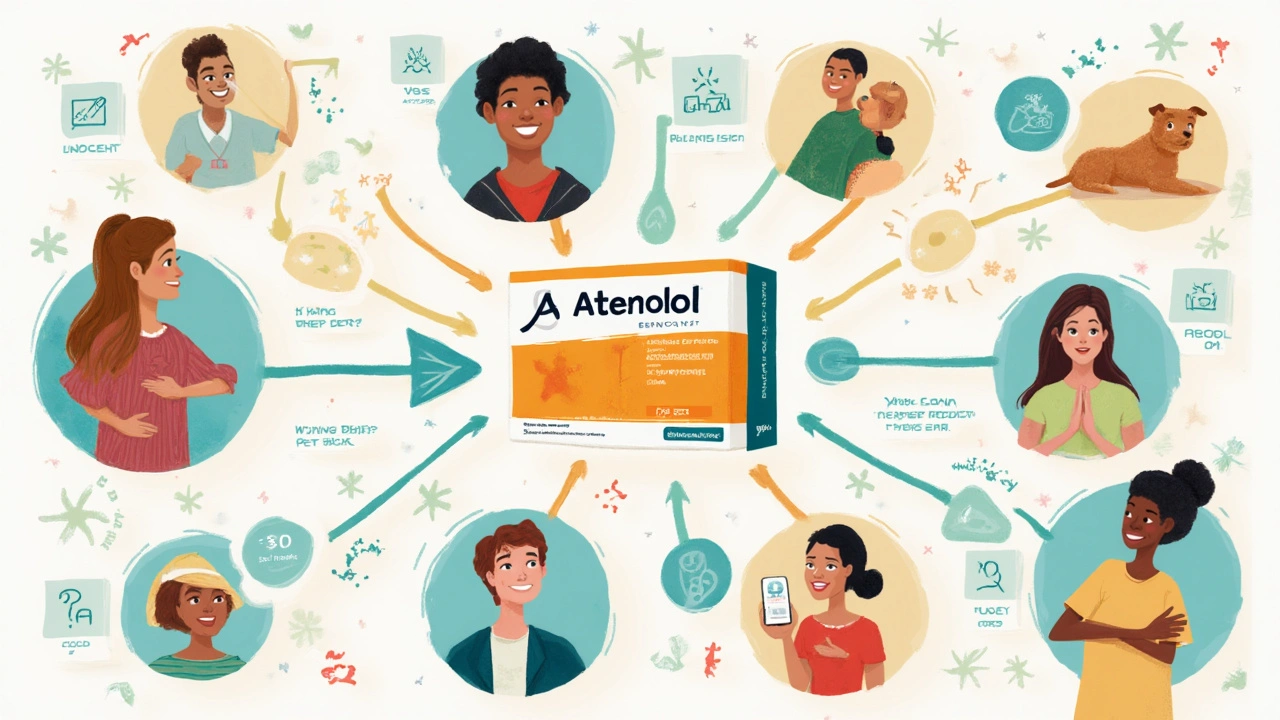Pop a tiny pill each morning and you might honestly forget something so small could be a double-edged sword. Atenolol isn't exactly a household name like aspirin or Tylenol, but for folks dealing with high blood pressure, it can feel like a lifeline. Now, toss allergies into the mix, and suddenly this little drug has people scratching their heads: Is it safe? Will it mix poorly with those pesky pollen woes or a heightened sensitivity to bee stings and peanuts? Most people just want to feel good without risking a spiral of allergic reactions. Let's break down the surprising relationship between atenolol and allergies, weaving in the science, quirky real-life tips, and answers to the stuff you really worry about.
What is Atenolol—and How Does It Work in Your Body?
Atenolol strolls into pharmacies under brand names like Tenormin. It's what your doctor calls a beta blocker. The basic idea? Atenolol slows down your heart's pump, helping blood pressure drop to safer zones. It’s not just about blood pressure though—it also steps in if your heart beats too fast or skips a beat. Some doctors lean on it to stop chest pain or help after a heart attack. If you've ever wondered how it works, imagine it putting up little 'No Trespassing' signs on certain body cells, stopping stress chemicals like adrenaline from speeding things up. Less adrenaline hitting your heart means everything runs calmer, steadier. It isn’t a cure, but it’s a solid way to keep the engine from overheating.
If you're curious about just how common atenolol is, check this out: about 30 million prescriptions were written for beta blockers in the U.S. in one recent year. Atenolol led the charge, especially for folks over 50. But it doesn’t just drift through your system without impact—it also latches onto tiny beta-adrenergic receptors, especially in your heart. This is important, because those same receptors are hiding out in other surprising places, including the lungs and blood vessels. And here’s where it gets sticky for allergy sufferers—those receptors play a role in how your body deals with allergic triggers, too.
Think atenolol is off-limits if you have allergies? Not always. But it definitely comes with some warnings you shouldn’t ignore, especially if you’re at risk for severe reactions. Understanding exactly how it works inside your body makes it easier to have serious conversations with your doctor instead of just nodding through the pharmacy sheet and moving on.
Allergies 101: What Happens During an Allergic Reaction?
There’s nothing quite like sneezing your way through spring, but allergies are about more than runny noses. When you’re allergic to something, your immune system throws a temper tantrum over stuff that should be harmless—the pollen in the air, the peanut butter on your toast, even your neighbor’s dog. Your body releases histamine and other chemicals to fight the “invader,” but all that defense turns into itching, swelling, coughing, hives, or worse.
It doesn’t stop at sneezing. Some folks know what it's like to have a full-blown anaphylactic reaction: trouble breathing, swelling lips or tongue, a pounding heart, and low blood pressure that makes you dizzy. It’s the kind of thing you need an EpiPen for. But here’s the kicker—if you’re on certain medications, your body's ability to fight off or recover from those symptoms changes. That’s crucial info for anyone with a known allergy and a prescription for atenolol in their medicine cabinet.
We're talking about millions of Americans here. According to the CDC, more than 50 million people in the U.S. have allergies. That’s almost one out of every five people, and plenty of those folks wind up on beta blockers at some point in life. Pollen, nuts, shellfish—if any of those sound familiar, atenolol's role in your allergy story suddenly matters a lot. The way it interacts with your system is a hidden chapter a lot of people never read until they hit a bump in the road.

Why Atenolol Can Be Tricky for People With Allergies
This is where the plot thickens. Atenolol belongs to a class of drugs called selective beta-blockers, which means it’s more focused on the heart than the lungs, but not completely. When an allergic reaction hits, your doctor may need to give you certain medicines like epinephrine (that’s what’s in an EpiPen)—this medicine jumps in to open your airways and crank up your blood pressure fast. Beta blockers like atenolol can sometimes make that rescue mission less effective, even blunting your response to the very meds you need to survive a serious allergic attack. That’s a big deal.
The risk is higher if you have a history of anaphylaxis or need regular allergy shots (immunotherapy). Studies show that people on beta blockers are more likely to have a tough time bouncing back from severe allergic reactions. There’s even a sneaky risk that beta blockers can trigger allergic skin reactions themselves: itchy rash, hives, or more rarely, swelling in the tongue or lips (angioedema).
Doctors are well aware of these risks, yet sometimes there aren’t many alternatives for heart problems, so it becomes a game of balancing pros and cons. If you're on allergy shots, it's smart to let your allergist know you use *atenolol*—they might tweak your plan, keep a sharper eye on your reactions, or in some cases, recommend switching up your medication if that's possible.
Here’s a quick look at some real-life allergy and beta blocker data:
| Scenario | Risk Elevation | Notes |
|---|---|---|
| Allergy shots with atenolol | 2x risk | Severe reaction risk can double |
| Anaphylaxis, already on atenolol | Slower recovery | Epinephrine may work less well |
The bottom line: if you’re at risk for severe allergies, atenolol ramps up the need to be careful, coordinate with your doctor, and always have your allergy emergency plan up to date. It doesn’t mean you must ditch atenolol, but you can’t ignore the risks.
Signs You Should Watch Out For: Atenolol and Allergic Reactions
If you’re taking atenolol with a history of allergies, pay extra close attention to changes in your symptoms or how your body reacts to everyday triggers. People sometimes chalk up mild symptoms to “normal allergy stuff,” but things get complicated when medications throw off your usual playbook. For example, atenolol can mask some allergic reaction warning signs. It might make the typical racing heart (tachycardia) less obvious during anaphylaxis, so you don’t get that panicky clue until things are more serious.
Here’s what to look for:
- Breathing trouble or coughing that seems worse than usual, especially if you’ve never had asthma before.
- Swelling in your lips, tongue, face, or throat, even if you haven’t eaten anything new.
- Unexplained itching, hives, or a rash on your arms, chest, or legs.
- Dizzy spells that seem out of nowhere, which can mean low blood pressure.
- Difficulty bouncing back after a mild reaction—you feel wiped out, weak, or short of breath longer than before.
Always keep your emergency meds (like antihistamines, inhalers, or EpiPens) handy, and make sure the people around you know where they are and how to use them. Double-check expiration dates, and if in doubt, ask your doctor for a fresh prescription. Let friends and family know you’re on atenolol and teach them what to watch for if you ever need help. If you feel strange, don’t tough it out—get help. Every extra minute matters when dealing with allergic reactions while on a beta-blocker.

Tips for Managing Atenolol When You Have Allergies
Managing your health can feel pretty intense, but there are some concrete steps you can take to make life on atenolol safer when allergies are part of the picture. Communication comes first—talk openly with every doctor you see about both your allergies and your medication. Your primary doctor, cardiologist, and allergist all need to know you’re taking atenolol so they can make the best call if problems pop up.
Ask your healthcare provider if there are other beta-blockers (like metoprolol or bisoprolol) that could be safer for you, since some are less “sticky” on airway receptors. Not everyone can make the swap, but it’s worth the conversation. If you get allergy shots, always have them done in a clinic with strong emergency support—never at home. Print up a basic allergy action plan and stash a copy with your ID.
You might also want to:
- Wear a medical alert bracelet that lists both your allergies and the fact that you’re on atenolol so emergency teams know what they’re dealing with.
- Download an app on your phone for quick medical summaries, which can help if you ever feel too foggy to talk.
- Keep a list of your meds handy, and update it after every prescription change.
- Check ingredient labels closely—not just for food, but for over-the-counter meds and supplements, which sometimes sneak in allergens or interfere with your medicine.
- Schedule regular check-ins with your doctor to go over any new symptoms or changing reactions, instead of waiting for your yearly physical.
Your pharmacist can help, too. They’re underrated when it comes to catching drug and allergy interactions, so build a habit of asking them to double-check if any new med could clash with your atenolol or allergy triggers.
For the most important tip: never, ever stop atenolol suddenly without talking to your doctor. Abruptly quitting can spark chest pain, dangerous spikes in blood pressure, or even a heart attack. There’s a right way to taper off if needed, and your medical team will know what works best for you based on your health history.
Living well with allergies and heart meds means knowing exactly what’s going into your body and being a proactive part of your own care team. With a bit of planning and honest conversations, you can stay safer and sidestep some of the landmines that catch people off guard. At the end of the day, smart choices beat scary surprises every single time.


Michelle Abbott
July 18, 2025 AT 11:21The pharmacodynamics of atenolol in the context of immunologic hypersensitivity presents an intriguing discussion point, particularly considering its beta-1 receptor selectivity and the potential for cross-reactivity in polysensitized individuals.
While atenolol is cardioselective, its ramifications on bronchoconstrictive pathways can not be summarily dismissed, especially in subjects with atopic predispositions. The molecular interactions, albeit limited, warrant thorough preclinical scrutiny to mitigate adverse responses.
Moreover, posological adjustments should be meticulously calibrated considering the cytochrome P450 enzymatic variations that could alter pharmacokinetic profiles in allergic patients.
Ultimately, a multi-disciplinary dialog incorporating allergology and cardiology insights would greatly enhance therapeutic outcomes for this demographic segment.
Heather Jackson
July 21, 2025 AT 11:26Wow, this article really nailed the anxiety I feel when mixing medication with allergies. I mean, who doesn’t worry about unexpected reactions? The way the article clearly broke down the risks and practical tips was super helpful.
However, I think they could have touched more on seasonal allergies versus chronic ones because my asthma flares up differently with each. Not to mention, what about other beta-blockers? Does atenolol stand out in terms of allergenic potential?
Has anyone here tried talking to their doc about alternative drugs or supplements when dealing with allergies and blood pressure meds? It’s a messy path for sure.
Akshay Pure
July 22, 2025 AT 18:00Honestly, from a medical standpoint, it’s quite elementary to infer that atenolol’s beta-1 selectivity implies minimal interference in histamine-mediated allergic reactions. Yet, the common layperson fright over such medications stems from ignorance rather than evidence-based medicine.
Implementing rational pharmacotherapy should dismiss unwarranted fears and instead focus on clinical vigilance for atypical presentations rather than generalized contraindications.
Therefore, a well-constructed patient education initiative is imperative to raise pharmacological literacy among those bewildered by such drug-allergy interactions.
Matt Stone
July 24, 2025 AT 11:40Need to cut to the chase here. Is atenolol safe for allergy sufferers or not? I appreciate the article’s detail but what’s the bottom line?
Also, what kind of allergic reactions are we really talking about? Mild seasonal stuff or life-threatening anaphylaxis risks?
Anyone here with firsthand experience taking atenolol and dealing with allergies?
Jessica Martins
July 27, 2025 AT 09:06The article offered a comprehensive overview, particularly emphasizing the importance of consulting healthcare providers when managing polypharmacy in allergy-prone individuals. Clinically, atenolol’s propensity to induce bronchospasm is relatively low, yet vigilance remains paramount.
Patients must be educated about symptom recognition and advised to seek immediate care if hypersensitivity manifestations occur.
It’s also prudent for clinicians to review patients’ full allergy histories before initiating beta-blocker therapy.
Doug Farley
July 30, 2025 AT 20:26Yeah, because everyone just loves popping pills that might make their allergies worse, right? Sign me up for the harm parade.
But for real, the article skirts around the fact that beta-blockers can be a nightmare for anyone with asthma or severe allergies. It’s like playing medical roulette.
Anyone else think doctors get to say 'trust me' way too often? What about actual data and patient experiences?
And don’t even get me started on how often they just shrug when you mention allergies.
Jeremy Olson
August 2, 2025 AT 04:00From a clinical standpoint, Atenolol has a relatively favorable safety profile in most allergy-suffering patients but with a caveat about history of bronchospastic diseases. Collaboration among healthcare providers to tailor medication regimens is critical.
Also, patient education about symptom vigilance and when to seek help cannot be overstated. It’s about balancing therapeutic benefits against possible risks.
Regular review and open channels of communication between patient and physician are the cornerstones of safe atenolol use.
Ada Lusardi
August 3, 2025 AT 07:46OMG, first time I took atenolol, my nose was a complete waterfall with sneezing like a crazy person 🤧. Was it the medicine or my seasonal allergies flaring? So confusing!
Luckily, my doc told me to monitor symptoms and assured me atenolol rarely causes severe allergic issues, but still, the anxiety was real!!
Does anyone else get weird allergy symptoms or increased sensitivity when on beta-blockers? I’m scared to switch meds but wanna feel normal again 😢.
Scott Davis
August 6, 2025 AT 19:06This is useful info. I’ve taken atenolol before and noticed my seasonal allergies weren’t worse, but I haven’t had severe allergy symptoms either.
The comments about consulting a doctor are spot on—I always tell my friends with allergies to mention any history before starting new meds.
Good to see an article that breaks this down instead of scaring people away from meds that might help them.
Calvin Smith
August 10, 2025 AT 06:26Look, if you’re scared to take atenolol because of your allergies, maybe medicine isn’t your bag at all. Some of y’all treat meds like they’re the devil incarnate.
Reality check: atenolol is a golden standard for heart conditions. Allergies? Usually don’t mix badly with it.
So stop the hysterics and face facts. Consult your docs, take your meds. It’s not rocket science folks.
Brenda Hampton
August 14, 2025 AT 21:33Hey everyone, I’ve been reading these comments and the article, and I was wondering about the tips mentioned for managing risks. Has anyone tried any natural approaches alongside atenolol to lessen allergy symptoms?
Like, would supplements or dietary changes really help, or is that just nothing but hype? I’m curious because dealing with allergies and heart meds simultaneously feels like juggling chainsaws.
Would love to hear some real-life experiences or scientific perspectives!
Jessica Martins
August 17, 2025 AT 05:06Responding to the question about natural approaches, it's essential to exercise caution here. Some supplements might interact with atenolol and alter its effectiveness or increase side effect risks.
For example, potassium supplements or certain herbal remedies can affect blood pressure regulation in unpredictable ways when combined with beta-blockers.
Therefore, any adjunctive natural treatments should be discussed thoroughly with healthcare providers to ensure safety.
While lifestyle changes like diet, exercise, and allergen avoidance are beneficial, they don't replace pharmacotherapy but can complement it.